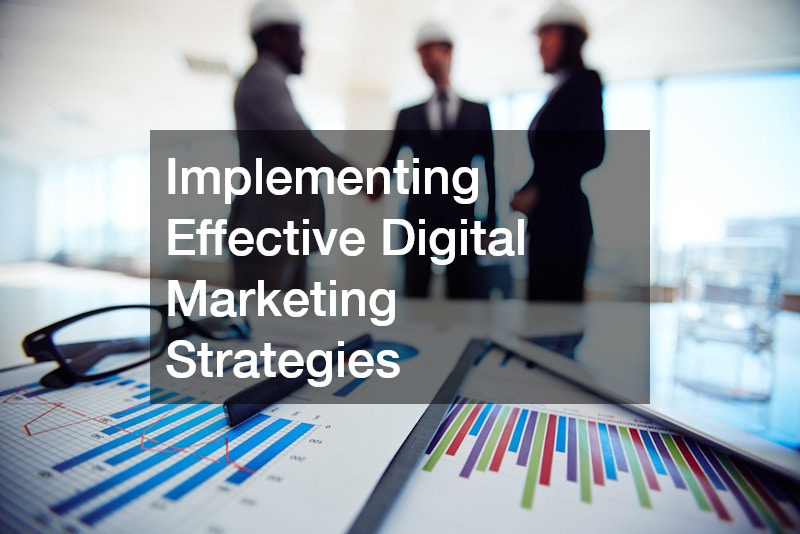Utilizing Marketing Strategies With Technology
In today’s competitive marketplace, businesses are constantly seeking ways to improve their management strategies to drive growth and efficiency. Business management marketing plays a pivotal role in achieving this, as it encompasses the techniques and approaches used to market a company’s products or services effectively while also streamlining internal operations. Understanding the principles of this marketing practice allows businesses to enhance their communication, better serve their customers, and ultimately achieve a more sustainable business model. This blog explores the best practices in business management marketing, offering insights into how various sectors can implement strategies that drive success.

Understanding the Fundamentals of Business Management Marketing
Business management marketing begins with a deep understanding of the market in which a company operates. It involves researching customer needs, identifying industry trends, and building a strategy that aligns with both internal goals and external demands. A strong foundation in marketing fundamentals helps businesses develop a cohesive message, which is essential for reaching the target audience effectively. By defining clear marketing objectives and using data to guide decision-making, companies can ensure their campaigns are both effective and efficient. This foundational knowledge serves as the cornerstone of any successful marketing initiative, regardless of industry.
For local engineering companies, mastering these fundamentals is particularly important. These companies often operate in highly specialized markets where building trust and credibility is essential. Through strategic business management marketing, they can better understand their customer base, identify unique selling points, and communicate their value proposition more effectively. Whether it’s showcasing expertise in complex engineering projects or highlighting their commitment to innovation, these companies can use targeted marketing efforts to differentiate themselves from competitors and meet client needs more successfully.
Developing a Strong Brand Identity for Your Business
A crucial component of business management marketing is the development of a strong brand identity. A well-defined brand goes beyond a logo or slogan; it encapsulates the core values, mission, and personality of a business. By creating a consistent brand identity, businesses can foster trust and loyalty among customers. This involves not only how a company presents itself visually but also how it communicates across various platforms and channels. Effective branding helps businesses stand out in crowded markets and creates an emotional connection with consumers, which is key to long-term success.
For a lawn irrigation company, developing a strong brand identity is essential to differentiate from competitors in the home and commercial landscaping markets. By establishing a brand that emphasizes reliability, environmental sustainability, and expertise in water conservation, a lawn irrigation company can appeal to eco-conscious customers looking for efficient irrigation solutions. Through thoughtful business management marketing strategies, this company can build a brand that resonates with its target audience, ensuring that its name becomes synonymous with quality and innovation in the lawn care industry.

Implementing Effective Digital Marketing Strategies
One of the most vital aspects of business management marketing today is the implementation of digital marketing strategies. The digital landscape has transformed how businesses connect with their audience, making it essential for companies to embrace online channels such as social media, email marketing, and search engine optimization (SEO). Effective digital marketing helps businesses reach a broader audience, build brand awareness, and track the success of their campaigns through analytics. By leveraging digital tools, businesses can enhance their customer engagement and stay competitive in a fast-paced, tech-driven marketplace.
For a digital marketing agency, mastering these strategies is a core competency. Agencies must stay ahead of the curve by offering innovative services such as pay-per-click advertising, content creation, and advanced SEO techniques. Through expert business management marketing, a digital marketing agency can promote its services while demonstrating the effectiveness of its methods. This not only attracts clients but also showcases the agency’s ability to adapt and provide cutting-edge solutions in the digital marketing sphere. By continuously refining these strategies, agencies can drive results and deliver measurable outcomes for their clients.
Leveraging Data Analytics for Better Decision-Making
In modern business management marketing, data analytics has become a powerful tool for making informed decisions. By collecting and analyzing customer data, businesses can gain insights into consumer behavior, preferences, and market trends. This data-driven approach allows companies to fine-tune their marketing strategies, optimize campaign performance, and allocate resources more effectively. Whether it’s through customer segmentation, predictive analytics, or performance metrics, leveraging data can significantly improve marketing outcomes and overall business growth.
For renovation builders, utilizing data analytics can be particularly beneficial. By analyzing customer preferences and project trends, builders can tailor their services to meet the specific needs of their clients. For example, data might reveal a growing demand for eco-friendly renovations, allowing the company to focus on promoting sustainable building materials and energy-efficient designs. Through effective business management marketing, renovation builders can use data to not only enhance customer satisfaction but also to position themselves as forward-thinking leaders in their industry.

Optimizing Customer Relationship Management Tactics
Customer relationship management (CRM) is a cornerstone of business management marketing. Optimizing CRM tactics involves more than just using software; it’s about creating meaningful, long-term relationships with customers. Businesses that effectively manage their customer relationships are better able to retain clients, increase loyalty, and foster repeat business. CRM strategies should focus on understanding customer needs, personalizing interactions, and ensuring that all customer touchpoints are seamless and efficient. By nurturing these relationships, businesses can build a loyal customer base that supports ongoing growth.
For a document management service, optimizing CRM tactics is vital for maintaining strong client relationships in a service-oriented industry. These companies often manage sensitive and critical documents for their clients, making trust and reliability key factors in customer satisfaction. By implementing a CRM system that tracks customer interactions, anticipates client needs, and provides timely solutions, document management services can ensure that their customers feel valued and supported. Through tailored business management marketing, these companies can position themselves as dependable partners, fostering long-term loyalty and satisfaction.
Building a Consistent Content Marketing Strategy
A key component of business management marketing is developing and maintaining a consistent content marketing strategy. Content marketing involves creating and sharing valuable, relevant content to attract and engage a target audience. This strategy not only helps establish a business’s authority in its industry but also improves customer retention by providing ongoing value. Consistency is crucial—whether through blogs, videos, or social media posts—because it reinforces a business’s message and builds trust over time. With a well-planned content marketing strategy, businesses can nurture relationships with potential customers and drive long-term success.
For marketing printing services, a consistent content strategy is essential for demonstrating expertise in areas like print production, design trends, and promotional materials. By sharing case studies, client testimonials, and tips on effective marketing materials, printing services can position themselves as experts in the industry. Through business management marketing efforts, they can ensure that their content is not only informative but also aligned with their brand’s message. This consistency across various platforms will help build credibility, engage customers, and attract new business.

Utilizing Social Media Platforms to Enhance Engagement
Social media has become an indispensable tool in business management marketing, enabling companies to connect directly with their audience, increase brand visibility, and drive engagement. By maintaining an active presence on platforms such as Facebook, Instagram, LinkedIn, and Twitter, businesses can reach their target audience in real-time. Effective social media marketing involves not just posting promotional content but also engaging with followers through comments, messages, and interactive content like polls or live videos. By fostering these interactions, companies can build a loyal community around their brand, which ultimately leads to higher customer retention and conversion rates.
For roofing contractors, social media can be a valuable tool for showcasing completed projects, sharing customer reviews, and educating the public on roofing maintenance and repairs. By sharing high-quality images of their work and offering expert tips on roofing care, contractors can position themselves as trusted professionals. Through targeted business management marketing on social media platforms, roofing contractors can not only attract new clients but also maintain ongoing relationships with previous customers by offering continued value and engagement.
Establishing Clear Marketing Objectives and KPIs
Setting clear marketing objectives and key performance indicators (KPIs) is fundamental to effective business management marketing. Objectives provide direction for marketing efforts, ensuring that each campaign is aligned with broader business goals, such as increasing brand awareness, boosting sales, or expanding into new markets. KPIs, on the other hand, offer measurable benchmarks that allow businesses to track their progress and assess the success of their campaigns. By establishing specific, achievable goals and using KPIs to monitor performance, businesses can adjust their strategies in real time and ensure their marketing efforts are driving the desired results.
For paving contractors, defining marketing objectives and KPIs is essential to stay competitive in a crowded market. For instance, objectives may include increasing local visibility or generating leads for commercial paving projects. KPIs such as website traffic, lead conversion rates, and customer satisfaction scores help track the effectiveness of these efforts. By using these tools in their business management marketing plan, paving contractors can ensure that they are meeting their goals and continuously improving their marketing strategies to drive growth and customer loyalty.
Fostering Innovation Through Market Research
Market research is a vital element of business management marketing, allowing companies to understand their industry, competitors, and customer preferences. By conducting thorough market research, businesses can identify emerging trends, assess the viability of new products or services, and develop strategies that resonate with their target audience. Innovation often comes from understanding gaps in the market or unmet customer needs, and market research provides the insights needed to foster such innovation. This proactive approach helps businesses stay ahead of the competition and adapt to changing market conditions.
For a commercial concrete company, market research can uncover opportunities in areas such as sustainable building materials or new construction techniques. Understanding industry shifts, like the demand for eco-friendly solutions, allows concrete companies to innovate their services and offer products that meet modern building standards. Through effective business management marketing, these companies can use research to guide their decision-making, ensuring that their offerings remain relevant and that they can tap into new growth areas within the commercial construction sector.
Measuring and Adjusting Marketing Campaign Performance
In business management marketing, measuring the performance of marketing campaigns is critical to success. By tracking key metrics such as return on investment (ROI), customer engagement, and conversion rates, businesses can evaluate whether their marketing strategies are meeting their objectives. Regular performance assessments allow companies to identify which tactics are working and which need adjustment. This iterative process of measuring and refining campaigns ensures that marketing efforts remain effective and continue to contribute to overall business growth.
For air conditioning companies, measuring campaign performance can highlight how well their marketing efforts are driving leads and conversions. For example, tracking how many new service calls are generated from online ads or seasonal promotions provides valuable insight into campaign effectiveness. By using business management marketing to analyze these metrics, air conditioning companies can adjust their strategies to maximize their marketing spend, target the right audience, and increase customer satisfaction. This data-driven approach ensures that their marketing efforts are not only cost-effective but also aligned with business growth goals.
Maintaining New Business Momentum
Effective business management marketing is essential for any company aiming to thrive in today’s dynamic business environment. By understanding fundamental marketing principles, companies can create a solid foundation for their marketing strategies. The best practices in business management marketing, such as building a strong brand identity, leveraging digital tools, and optimizing customer relationships, provide businesses with the tools they need to succeed. Through consistent content marketing, social media engagement, and data-driven decision-making, businesses can enhance their market presence and build lasting relationships with customers. Measuring performance and fostering innovation through research allows companies to stay agile and responsive in a competitive landscape. Each of the industries we’ve explored—from local engineering companies to air conditioning providers—can benefit from these tailored business management marketing strategies. By applying these practices, businesses can effectively reach their target audience, improve customer loyalty, and ultimately achieve sustainable growth.

